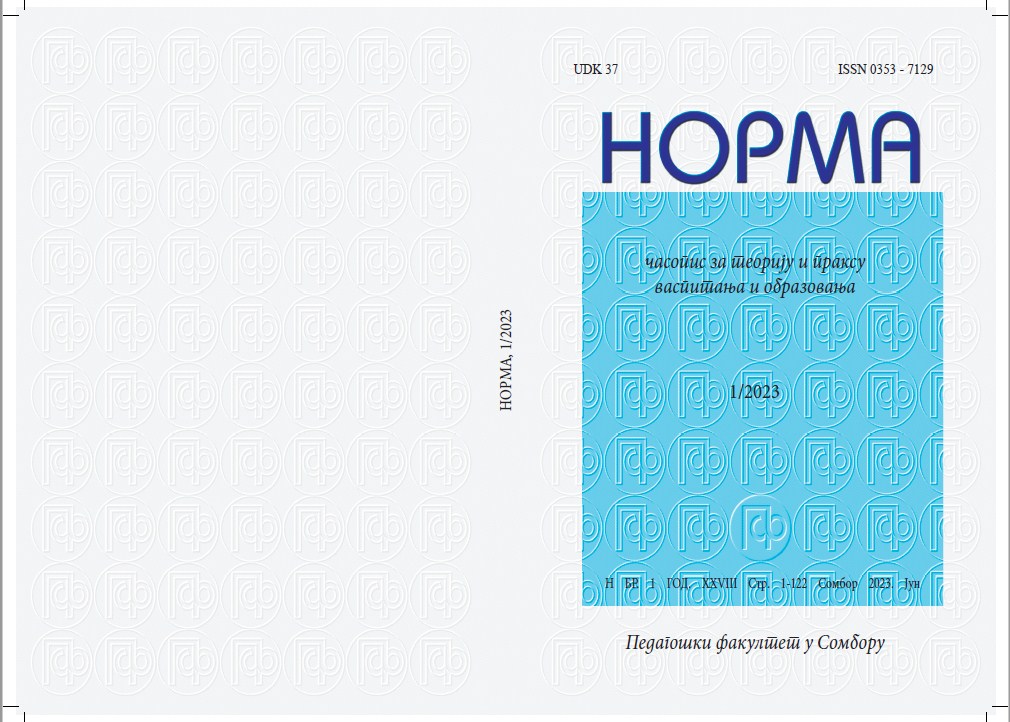Teacher’s experiences in working with children with developmental disabilities
Abstract
Teachers are often mentioned among the key factors of the quality of the teaching process, and it is considered that teachers with experience in working with children with disabilities are more confident in their professional knowledge and skills and have high expectations of their students, despite the fact that some of them may have severe degree of developmental disability. The successful implementation of inclusive education in the sense of placing students with disabilities in classrooms within the regular system of education could contribute to the competence of teachers in this area, but also to their motivation to provide appropriate instructions and assistance. The goal of the research is to determine what type of developmental disabilities teachers most often encountered within the framework of direct work in education. The sample consisted of 288 teachers, and a questionnaire created for the purposes of this research was used. Based on the results of the research, it was determined the presence of differences in the type of disabilities among students included in the regular education system, compared to schools for the education of children with developmental disabilities, as well as a greater presence of children with developmental disabilities in the older grades of elementary school. There are also differences in the experience of teachers employed in urban areas compared to those employed in rural areas.
References
Bandura, A. Self-efficacy: The exercise of control. New York, NJ: Freeman Lawrence; 1997.
Beacham, N., & Rouse, M. (2012). Student teachers’ attitudes and beliefs about inclusion and inclusive practice. Journal of Research in Special Educational Needs, 12(1), 3-11. https://doi.org/10.1111/j.1471-3802.2010.01194
Dragojević, T. N., & Letić-Lungulov, M. M. (2022). Efekti očekivanja nastavnika na motivaciju učenika za učenje. Norma, 27(1), 29-40. https://doi.org/10.5937/norma27-37537
Ernst C, Rogers MR. Development of the inclusion attitude scale for high school teachers. J Appl Sch Psychol. 2009;25(1):305-22
Kosko KW, Wilkins JLM. General educators’ in-service training and their self-perceived ability to adapt instruction for students with IEPs. The Professional Educator. 2009;33(1):1-10.
Donohue, D. K., & Bornman, J. (2015). South African teachers’ attitudes toward the inclusion of learners with different abilities in mainstream classrooms. International Journal of Disability, Development and Education, 62(1), 42-59. https://doi.org/10.1 080/1034912X.2014.985638
Fazlagić, A., Kolić, M. Samoefikasnost nastavnika razredne nastave za inkluzivno obrazovanju dece sa smetnjama u razvoju. Naučne publikacije državnog Univerziteta u Novom Pazaru, Serija B: Društvene & humanističke nauke. 2018; 2(1):153-64.
Habulin, L. (2018). Stavovi i kompetencije školskih pedagoga za inkluzivnu praksu. Diplomski rad. Rijeka: Filozofski fakultet.
Horzum, T., & Izci, K. (2018). Preservice Turkish teachers’ views and perceived competence related to inclusive education. Journal of Education and E-Learning Research, 5(2), 131-143.
Hrnjica, S., Sretenov, D. (2007). Deca sa razvojnim teškoćama u redovnim osnovnim školama u Srbiji, Istraživačka studija. Beograd: Save the Children.
Јаблан, Б. Ђ., & Максимовић, Ј. М. (2020). Развој инклузивног образовања из угла наставничких компетенција - стање, проблеми и перспективе. Зборник радова Педагошког факултета, Ужице, 22, 85-100. https://doi.org/10.5937/ZRPFU2022084J
Jovanović-Popadić, A. (2016). Inkluzivno obrazovanje: Ideja i praksa. Sinteze, 10, 35- 46.
Kalmar, L., & Janković, A. (2021). Kompetencije nastavnika razredne nastave kao činilac efikasnosti obrazovanja u savremenoj školi. Norma, 26(2), 149-157.
https://doi.org/10.5937/norma2102149K
Karić, T., Mihić, V., Korda, M. (2014). Stavovi profesora razredne nastave o inkluzivnom obrazovanju dece sa smetnjama u razvoju. Primenjena psihologija, 7 (4), 531-548.
Knežević Florić, O., Ninković, S., Tančić, N. (2018). Inkluzivno obrazovanje iz perspektive nastavnika: uloge, kompetencije i barijere. Nastava i vaspitanje, 68 (1), 7-22.
Malinen O, Savolainen H, Engelbrecht P, Xu J, Nel M, Nel N. Exploring teacher self-efficacy for inclusive practices in three diverse countries. Teach Teach Educ. 2013;33(1):34-44.
Nikolić, S. (2017). Implementacija inovativnih modela u inkluzivnoj nastavi. Norma, 22(1), 53-61.
Pravilnik o bližim uputstvima za utvrđivanje prava na individualnim obrazovni plan, njegovu primenu i vrednovanje (2010). Službeni glasnik Republike Srbije, br. 76/2010.
Rajšli-Tokoš, E. (2020). Obrazovanje dece sa smetnjama u razvoju. Norma, 25(1), 31-42. https://doi.org/10.5937/norma2001031R
Skenderović, I., Kadrić Aljković, S., Kriještora, F., Fetić, M. (2018). Inkluzivno obrazovanje djece ometene u razvoju. Educa, (11), 85-92.
Skočić Mihić, S., Gabrić, I., Bošković, S. (2016). Učiteljska uvjerenja o vrijednostima inkluzivnog obrazovanja. Hrvatska revija za rehabilitacijska istraživanja, 52 (1), 30-41.
Unianu, E. M. (2012). Teachers’ attitudes towards inclusive education. Procedia - Social and Behavioral Sciences 33 (1), 900-904. DOI:10.1016/j.sbspro.2012.01.252
Vlah, N., Međimorec Grgurić, P., Baftiri, Đ. (2017). Demografska i profesionalna obilježja srednjoškolskih nastavnika u relaciji sa stavovima prema edukacijskom uključivanju. Hrvatska revija za rehabilitacijska istraživanja, 53 (1), 86-100.
Vukobrat, A. (2016). Istorijski pregled razvoja ideje o inkluzivnom vaspitanju i obrazovanju, Norma, XXI(2), 299–310.
Zakon o osnovama sistema obrazovanja i vaspitanja (2017). Prosvetni glasnik, Službeni glasnik Republike Srbije, br. 88/2017.
Џинкић, О. (2019). Историјски приказ реформних педагошких идеја – данашњи исходи и достигнућа. Зборник радова Педагошког факултета, Ужице, 21, 9-26.
Copyright (c) 2023 Norma

This work is licensed under a Creative Commons Attribution 4.0 International License.

